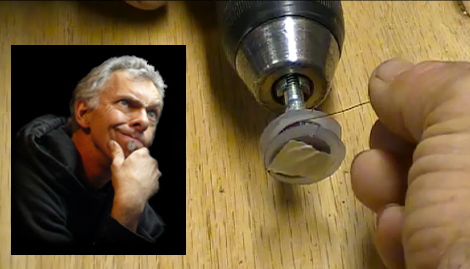
[Dino Segovis] is at it again! For this week’s installment of his “Hack A Week” series [Dino] is holding a guitar pickup winding 101. Professional guitar pickups can cost hundreds of dollars, but are all essentially a permanent magnet wrapped in a bunch of wire. Using some cheap headphones, magnet wire, and a spare bolt [Dino] produces his own pickup and throws it in a one string blues guitar. This is a great beginner’s project as it involves only a few very easy to find parts and touches on some interesting concepts such as inductance and magnetic flux.
The premise is really simple: Sandwich the headphone magnet between two plastic discs to make a spindle, hot glue a 1/4″ bolt to the spindle, connect to a power drill, and wind a few thousand loops of magnet wire onto the thing. Hook your coil up to an amp and lay down a jam.
We might be tempted to add a counter to the rig using a reed switch connected to the “=” key of a cheap pocket calculator, and a magnet glued to the bolt. We have also seen a more complicated automated spool winder but [Dino] is keeping it nice and simple.
Check out the video after the jump to hear [Dino] go all Seasick Steve on us.
[youtube=http://www.youtube.com/watch?v=wKS0ZWCHI4g&w=470]















and just like that the video is gone
I’m not sure where you guys might source this gauge of magnet wire easily, but I have only been able to find it in relatively high bulk (a pound or two) at around $30/lb. That’s not terrible for me, because I build guitars as a hobby, but if I were someone just dicking around, I would be apprehensive about getting that much wire.
Also, it seems the video has been removed.
Fixed the video, hopefully that sticks.
I used to design a build pickups… been about 10 years. At that a group of guys from the pickup-building community started up a re-sale of magnets, bobbins, and magnet wire for hobbyist winders. I did some quick searches and can’t seem to find them around any more. There was a very informative forum at the time too… this might get some folks on the right path: http://www.firebottle.com/fireforum/fireBB.cgi?cfg=gt&forum=pmgd&enter=go
I wound my own pickup for a 3 string cigar box guitar last year. I bought ~12k feet of 43 ga wire on ebay for something like $8.
I used an electric drill, but no counter – just wound till the spool I made was full. Wrapped the wire in twine and dipped in wax to eliminate air. The permanent magnets were 3/16″ x 1/2″ neodymium.
Think I will be using the counter from an old tape recorder (saves wasting a perfectly good calculator that I can make into somthing a lot more interesting)
Why bother with any form of counter?
If you know the diameter of the bolt that you are winding onto, you know the gauge of the wire and you know how many turns you want, then you easily can calculate what length of wire is required. Just cut a length slightly over size and wind till its almost all gone.
Simples!
Nice!
AFAIK however, loudspeaker magnets concentrate as much energy as possible in the narrow gap where the voice coil hangs, and not so much outside. (making the flux pattern very different than the presented one)
There’s obviously enough leakage for it to work nicely, but if you have some conventional magnets (like [brad]’s) hanging around, you might be better off using them rather than sacrificing a speaker.
A lower efficiency pickup _is_ a good excuse to push your amp to 11 though :D
Jo
I have seriously never heard anyone call enamel wire “magnet wire” before.
ever.
is this just an american thing?
@alan
when some pickups take 5000-8000 feet of wire, it’s not that simple… :P
If you’re a cyclist, you can probably rig your odometer to count the turns quite easily, without modifying anything.
That enamel wire is in so many products like old speakers and electric motors and such, surely you can find some junk that has a coil inside?
Old computer fan maybe? Or old toy with an electric motor?
@pff I see it more an more, I guess it’s how they call it when they teach kids with their first experiments in electromagnetism? even though it causes confusion since people think it’s some kind of special material.
I would call it a one string dulcimer. I made one in grade school ooooh so long ago in music class.
An electric “strum stick”. Just don’t use the term strum stick where the guy who has trade marked it hear you. He will get on your case. I wonder if using the coil from the speaker that magnet was scavenged from would function as a pickup coil?
The speaker coil is always hard to separate from the plastic in those toy speakers (without breaking it), and it’s very thin and weak wire.
For anyone interested in measuring the amplitude and phase response characteristics of guitar pickups, there is an application note on our company web page:
Measuring Impedance and Frequency Response of Guitar Pickups
http://www.syscompdesign.com/AppNote.html
under ‘Applications & Educational Papers’.
Peter
So technically, if I wanted to make a hex pickup, I could take the pole magnets from a regular pickup, remove the coil, and individually coil them?
Use the primary from a 12vdc adapter. It’s is just about right or if you can wait just buy a chinese pickup ready to go for $5seaguy@juno.com